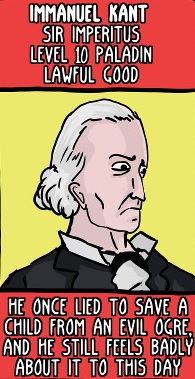
Over at Slate Star Codex, Scott is discussing my first philosophical love: Immanuel Kant. He likes that, in his words, Kant makes it easy for people to offer positive sum bargains without defection, but then brings up the problem of trying to figure out what maxims people are using, when you try to apply the universalizability test. For an example, he picks a Brendan Eich-like scenario, where a businessman cans an employee who turns out not to be pro-gay marriage.
Candice the Kantian condemns him, saying “What if that were to become a general rule? Then nothing would change except everyone only has half as many job opportunities.”
Levi says “Oh, I see your problem. You think my maxim is ‘fire people with different politics than me’. But that’s not my maxim at all. My maxim is ‘fire people who are homophobic’. If that becomes universalized, it will be a great victory for gay people everywhere, but no one whose politics I agree with will suffer at all.”
In fact, Levi might claim his maxim is any one of the following:
1. Everyone should fire people they disagree with politically
2. Everyone should fire people who are politically on the right
3. Everyone should fire people who discriminate against minority groups
4. Everyone should fire people who are homophobic
5. Everyone should fire people who are mean and hateful
6. Everyone should fire people who hold positions that are totally beyond the pale and can’t possibly be supported rationally
In order to subject maxims to a slightly harder test (and avoid rewarding sneaky phrasers) Scott suggests:
This is a hard problem. The best solution I can think of right now is to go up a meta-level, to say “universalize as if the process you use to universalize would itself become universal”.
This is pretty much my preferred solution, too. But if I wanted to put it a different way, more laden with entertaining metaphors, I might say, “shout your maxim down Archimedes’s Chronophone and universalize everything that comes out when you point it at different eras.”
Archimedes’s Chronophone is a fictional object invented by Eliezer Yudkowsky that facilitates communication between different time periods, up to a point. It handles all the language problems, but can’t pass along anything that’s too anachronistic. Here’s an example of how works:
You cannot suggest, for example, that women should have the vote. Maybe you could persuade Archimedes of Syracuse of the issue, and maybe not; but it is a moot point, the chronophone will not transmit the advice. Or rather, itwill transmit the advice, but it will come out as: “Install a tyrant of great personal virtue, such as Hiero II, under whose rule Syracuse experienced fifty years of peace and prosperity.” That’s how the chronophone avoids transmitting overly anachronistic information – it transmits cognitive strategies rather than words. If you follow the policy of “Check my brain’s memory to see what my contemporary culture recommends as a wise form of political organization”, what comes out of the chronophone is the result of Archimedes following the same policy of looking up in his brain what his era lauds as a wise form of political organization.
Thinking about the Chronophone makes it clearer that when I advise people to purge the folks I find beyond the pale, the universalized version of that maxim will include a lot of people I’d rather protect or leave alone. It also lends me a little skepticism about my own position or charity toward my enemy (“Oh, right! We’re both trying to protect people from harm, but we have radically different understandings of what harm is”).
Scott’s right that this all feels a bit like fusing Kant with Rawls, and reasoning from behind the veil of ignorance. I’d say the main difference is that, when I learn about Rawls, it feels more like finding a gamble you’re willing to take. From behind the veil of ignorance, you might pick Omelas — after all, aren’t you already tolerant enough of risk to drive to work?
With Kant, there’s no tolerable does of willed evil, since universalizability always blows the problem up to scales you actually care about. You get to (hypothetically) decide for the whole world, and actually do decide for the only part of it that’s actually within your locus of control. Think of Kantians as waging a moral counterinsurgency. The torch doesn’t drop on your leg of the relay, and we could live in Kant’s world if the next person carried it, too.
P.S. I’ve just read the first book in a series that features a very deontological heroine. In The Steerswoman, a steerswoman must truthfully answer any question given to her, and all people must truthfully answer hers, or no steerswoman will ever speak to them again. The protagonist is Sherlock-ish in terms of observation and analytic ability, but far kinder. I’m currently halfway through the next book in the series.












